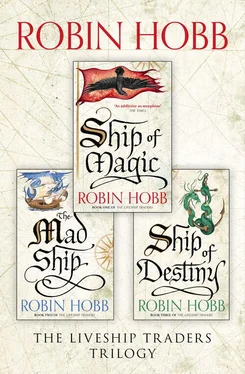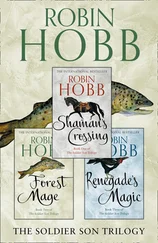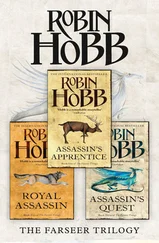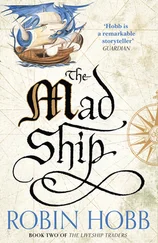Just as the rival ship had taken the best anchorage, so too her hunters had taken the prime island. By tradition the ships would not encroach on one another’s hunting territories. Past experience had taught them all that it led only to dead men and less profit for all. So the island where they put ashore was bare of all other human life. The rocky beaches were deserted, save for some very old sows resting in the shallows. The adult males had already left, beginning the migration back to wherever these creatures wintered. On the sandy inland plains, Althea knew they would find the younger females and this year’s crop of offspring. They would have lingered there, feeding off the late runs of fish and gathering fat and strength before they began their long journey.
The hunters and skinners remained in the boats when the rowers jumped overboard into the shallows and seized the gunwales of the skiffs to run the boats ashore. They timed this action to coincide with a wave to help them lift the boat clear of the sharp rocks. Althea waded out on the beach with the others, her soaked legs and wet boots seeming to draw in the cold.
Once ashore, she quickly found her duties, which seemed to be to do whatever the hunters and skinners didn’t care to do for themselves. She was soon burdened with all the extra bows, arrows, knives and sharpening stones. She followed the hunters inland with her arms heavily laden. It surprised her that the hunters and skinners walked so swiftly and talked so freely amongst themselves. She would have supposed this hunt to require some kind of stalking and stealth.
Instead, at the top of the first rise, the gently rolling interior of the island was revealed to her. The sea-bears sprawled and slept in clusters on the sand and amongst the scrub brush. As the men crested the hill, the fat creatures scarcely deigned to notice them. Those that did open their eyes regarded their approach with as little interest as they took in the dung-picker birds that shared their territory.
The hunters chose their positions. She was speedily relieved of the bags of arrows she had carried for them. She stood well back of them as they strung their bows and selected their targets. Then the deadly rain of arrows began. The animals they struck bellowed and some galloped awkwardly in circles before they died, but the creatures did not appear to associate their pain and deaths with the men upon the rise above them. It was almost a leisurely slaughter, as the hunters chose target after target and sent arrows winging. The throats were the chosen targets, where the broad-headed arrows opened the veins. Blood spilled thick. That was the death they meted out, that animals might bleed to death. This left the supple furs of their hides intact, as well as yielding meat that was not too heavy with blood. Death was not swift, nor painless. Althea had never seen much of meat-slaughter, let alone killing on such a scale. It repulsed her, and yet she stood and watched, as she was sure a true youth would have done, and tried not to let her revulsion show on her face.
The hunters were businesslike about their killing. As soon as the final arrows were expended, they moved down to reclaim them from the dead beasts, while the skinners came behind them like gorecrows to a battle scene. The bulk of the live animals had moved off in annoyance from the struggles and bellows of those struck and dying. They still seemed to feel no panic, only a distaste for the odd antics that had disturbed their rest. The leader of the hunters glanced at Althea in some annoyance. ‘See what’s keeping them with the salt,’ he barked at her, as if she had known she would have this duty and had neglected it. She scrambled to this command, just as glad to leave the scene of slaughter. The skinners were already at work, stripping the hide from each beast, salvaging tongues, hearts and livers before rolling the entrails out of the way and leaving the naked fat-and-meat creatures on their own hides. The knowledgeable gulls were already coming to the feast.
She had scarcely crested the rise before she saw a sailor coming toward her, rolling a cask of salt ahead of him. Behind him came a line of others, and she suddenly realized the scope of their task. Cask after cask of salt was making its way up the rise, while a raft of empty barrels was being brought ashore by yet another crew of sailors. All over the island, this was happening. The Reaper herself was securely anchored with no more than a skeleton crew aboard to maintain her. All the others had been pushed into the vast task of off-loading and ferrying kegs of salt and empty barrels ashore. And all, she realized, must then be transported back, the barrels heavy with salted meat or hides. Here they would stay to continue this harvest for as long as animals and empty barrels remained.
‘They want the salt now,’ she told the sailor pushing the first keg. He didn’t even bother to reply. She turned and ran back to her party of hunters. The hunters were already raining death down on another wing of the vast herd, while the skinners seemed to have finished fully half of what the hunters had already brought down.
It was the beginning of one of the seemingly endless bloody days that followed. To Althea fell the tasks that everyone else judged themselves too busy to do. She ferried hearts and tongues to a central cask, salting each organ as she added it to the barrel. Her clothes grew sticky and stiff with blood, dyed brown with repeated staining, but that was no different for anyone else. The erstwhile sailors who had been the debtors of Jamaillia were swiftly taught to be butchers. The slabs of yellowish fat were sliced clean of the meat and packed into clean barrels to be ferried back to the ship. Then the carcasses were boned out to conserve space in the barrels, the slabs of dark red meat were well-salted before they were laid down, and then over all a clean layer of salt before the casks were sealed. Hides were scraped clean of any clinging fat or red strips of flesh the skinners might have left, and then spread out with a thick layer of salt on the skin side. After a day of drying thus, they were shaken clean of salt, rolled and tied, and taken to the ship in bundles. As the teams of butchers moved slowly forwards, they left red-streaked bones and piles of gut-sacks in their wake. The sea-birds descended to this feast, adding their voices to those of the killers and the cries of those being killed.
Althea had hoped that she might gain some immunity to their bloody work, but with each passing day, it seemed to grow both more monstrous and more commonplace. She tried to grasp that this widespread slaughter of animals went on year after year, but could not. Not even the tangles of white bones on the killing fields could convince her that last year had seen slaughter on the same scale. She gave over thinking about it, and simply did her tasks.
They built a rough camp on the island, on the same site as last year’s camp, in the lee of a rock formation known as the Dragon. Their tent was little more than canvas stretched to break the wind and fires for warmth and cooking, but at least it was shelter. The sweet, heavy smells of blood and butchery still rode the wind that assailed them, but it was a change from the close quarters of the ship. The men built smoky fires with the resinous branches of the scrub brush that grew on the island and the scarce bits of driftwood that had washed up. They cooked the sea-bears’ livers over them, and she joined in the feasting, as glad as anyone over the change in their diet and the chance to eat fresh meat again.
In some ways, she was glad of her change in status. She worked for the hunters and skinners now, and her tasks were separate from those of the rest of the crew. She envied no one the heavy work of rolling the filled kegs back up the rise, over the rocky beach and then ferrying them back to the ship and hoisting them aboard and stowing them. It was mindless, back-breaking work. Drudgery such as that had little to do with sailing, yet no one of the Reaper ’s crew was excused from it. Her own tasks continued to evolve as the hunters and skinners thought of them. She honed knives. She retrieved arrows. She salted and packed hearts and tongues. She spread hides and salted hides and shook hides and rolled hides and tied hides. She coated slabs of meat with salt and layered it into casks. The frequent exchange of blood and salt on her hands would have cracked them had not they been constantly coated with thick animal fat as well.
Читать дальше











